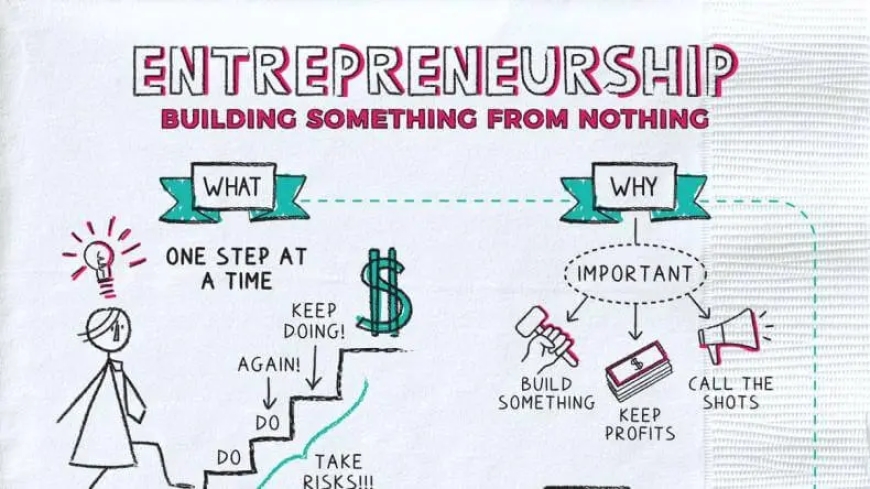Navigating 21st Century Entrepreneurship: Integrity, Partnerships, and Staying Relevant
Explore essential strategies for 21st-century entrepreneurs, focusing on integrity, strategic partnerships, and adaptability. Learn how to build a sustainable business in today’s evolving marketplace.

By Dr Kreeno
In today’s fast-paced and highly competitive business world, entrepreneurship demands more than just an innovative idea—it requires a strategic approach rooted in integrity, collaboration, and adaptability. The 21st century presents unique challenges, including rapid technological advancements, shifting consumer expectations, and an unpredictable global economy. Entrepreneurs who prioritize ethical business practices and form strong partnerships position themselves for long-term success. According to OpenStax (2024), integrity in business fosters trust, reduces reputational risks, and enhances brand loyalty, making it a crucial factor in sustainable growth. Additionally, transparency in operations and ethical decision-making contribute to positive customer relationships and regulatory compliance (MDPI, 2023). As businesses increasingly face scrutiny from stakeholders and regulatory bodies, maintaining high ethical standards becomes a key differentiator in the competitive marketplace.
Beyond integrity in business, the power of strategic partnerships cannot be overstated. In an era where collaboration fuels innovation, forming alliances with like-minded businesses and industry leaders provides access to critical resources, market expansion opportunities, and risk mitigation. Research from IJRPR (2023) highlights that businesses leveraging collaborative networks experience faster scalability and improved financial resilience. Partnerships allow entrepreneurs to pool expertise, enhance operational efficiency, and stay ahead of emerging market trends (Seahi Publications, 2024). Moreover, the ability to adapt and innovate remains a defining trait of successful modern entrepreneurs. As noted by Monitask (2024), agility in business decision-making enables companies to navigate economic uncertainties, technological disruptions, and evolving consumer behaviors effectively. By embedding integrity, strategic partnerships, and adaptability into their core operations, entrepreneurs can build resilient and future-proof businesses in an ever-changing global landscape.

Integrity: Your Non-Negotiable Superpower
Let’s cut to the chase: integrity isn’t just for Boy Scouts. In a world where a single tweet can tank a brand, trust is the ultimate currency. Consumers are more informed than ever, and they demand honesty, ethical business practices, and social responsibility from companies. According to the 2023 Edelman Trust Barometer, 81% of consumers say they need to trust a brand before making a purchase (Edelman, 2023). Trust isn’t just an abstract concept—it’s a measurable asset that directly impacts revenue and long-term business sustainability. Integrity must be the backbone of any business strategy, influencing leadership decisions, marketing communications, and customer engagement.
Transparency is the New Black
Remember when KFC ran out of chicken in the UK? Instead of hiding, they tweeted, “FCK, we’re sorry!” and turned a PR disaster into a viral win. Being upfront about mistakes (or supply chain meltdowns) doesn’t just salvage trust—it humanizes your brand. Transparency fosters authenticity, and authenticity drives loyalty. According to a Label Insight study, 94% of consumers are more likely to remain loyal to a brand that offers complete transparency (Label Insight, 2022). Transparency is no longer optional—it’s an expectation. Brands that openly communicate their successes and failures, like Buffer’s radical salary transparency, foster deeper connections with their audience. When businesses hide information or mislead customers, trust erodes. Volkswagen’s Dieselgate scandal is a cautionary tale; the company's deceptive emissions practices led to billions in fines, a damaged reputation, and a loss of consumer confidence (BBC, 2020). The lesson? Own your mistakes before the public calls you out.

Ethics > Quick Bucks
Ever heard of Theranos? Exactly. Cutting corners for short-term gains might pad your wallet today, but it’ll torch your reputation tomorrow. Elizabeth Holmes’ biotech startup promised revolutionary blood-testing technology, but behind the scenes, the company engaged in massive fraud. The result? Criminal convictions, lawsuits, and a cautionary case study on the consequences of deception (Carreyrou, 2018). In contrast, ethical companies like Patagonia have built trust through long-term commitments to values-driven leadership. Patagonia’s dedication to sustainability—such as donating 100% of Black Friday sales to environmental causes—proves that ethical business decisions can drive brand loyalty and profitability (Fast Company, 2022). Research from Harvard Business Review shows that 77% of consumers prefer to buy from companies that demonstrate ethical leadership, even if it means paying a premium (HBR, 2021). The takeaway? Integrity is a long-term investment, not a quick cash grab.
Social Responsibility: Do Good, Sell Better
Millennials and Gen Z don’t just buy products; they buy values. TOMS Shoes’ “One for One” model isn’t charity—it’s savvy marketing. Aligning your business with a cause isn’t just nice; it’s necessary. A Nielsen report found that 73% of global consumers are willing to pay more for sustainable products (Nielsen, 2021). The modern consumer expects brands to take a stand on social and environmental issues. Look at Ben & Jerry’s, which actively advocates for racial justice and climate action while maintaining strong sales growth. Similarly, brands like Bombas and Warby Parker have embedded social good into their business models, proving that corporate responsibility isn’t just ethical—it’s profitable (Forbes, 2023). Companies that fail to align with social values risk alienating their customer base. Take Victoria’s Secret, for example—their refusal to embrace inclusivity led to declining sales and a loss of cultural relevance (Business Insider, 2021). The message is clear: doing good isn’t just about philanthropy; it’s about staying relevant in a values-driven market.
in conclusion, Integrity isn’t just a moral choice—it’s a competitive advantage. Transparency, ethical leadership, and social responsibility aren’t just feel-good concepts; they’re essential to long-term business success. As consumers demand more accountability from brands, companies that operate with integrity will build lasting relationships, gain customer loyalty, and drive sustainable profits. In the 21st century, trust isn’t just earned—it’s everything.

Partnerships: Because Lone Wolves Get Eaten
Newsflash: Elon Musk didn’t build SpaceX alone. Even Batman had Robin. The myth of the self-made entrepreneur is just that—a myth. Behind every major business success is a network of mentors, investors, collaborators, and strategic allies. According to a Harvard Business Review study, 94% of high-growth startups attribute their success to strategic partnerships (HBR, 2023). Whether it’s seeking advice from experienced mentors, forming alliances with complementary businesses, or leveraging external funding sources, partnerships are the backbone of sustained business growth. The entrepreneurial landscape is more competitive than ever, and those who embrace collaboration rather than isolation gain a crucial edge.
Collaborative Networks: Your Brain Trust
Think of your network as a LinkedIn group chat IRL. Mentors, peers, and even friendly competitors can offer game-changing advice. A prime example is Sara Blakely, the founder of Spanx, who credits her business success to a mentor who advised her to patent everything before going public with her idea (Blakely, 2020). Without this crucial guidance, Spanx might have been copied and lost its first-mover advantage. Research from the Global Entrepreneurship Monitor (GEM) indicates that entrepreneurs who engage in mentorship programs have a 70% higher survival rate compared to those who go it alone (GEM, 2022). Successful entrepreneurs, from Mark Zuckerberg (mentored by Steve Jobs) to Oprah Winfrey (mentored by Maya Angelou), have relied on experienced advisors to navigate challenges. Building a strong network doesn’t just offer support—it provides access to expertise, resources, and new opportunities that can accelerate business growth.

Strategic Alliances: 1 + 1 = 3
When Spotify teamed up with Uber for the “Soundtrack Your Ride” initiative, both brands benefited. Uber riders gained a personalized music experience, while Spotify increased engagement on its platform (Forbes, 2017). This collaboration exemplifies the power of strategic partnerships—when two companies with complementary strengths join forces, the result is often greater than the sum of its parts. According to McKinsey & Co., companies with strong strategic partnerships grow 30% faster than those that operate in isolation (McKinsey, 2021). The key to a successful alliance is finding partners who fill your gaps. A tech whiz struggling with marketing? Team up with a branding expert. A visionary entrepreneur lacking funding? Seek out an investor who shares your vision. Strategic alliances not only expand a business’s capabilities but also help mitigate risks by distributing responsibilities and resources more effectively.
Resource Hacking: Doing More with Less
No VC funding? No problem. Entrepreneurs today have more options than ever to access capital and resources beyond traditional venture capital. Crowdfunding platforms like Kickstarter and Indiegogo have empowered thousands of startups to launch without taking on debt or giving up equity (Statista, 2023). Notably, Pebble, the smartwatch company, raised over $10 million on Kickstarter, proving that customers can be the best investors (Kickstarter, 2016). Additionally, many entrepreneurs leverage business incubators and accelerators, such as Y Combinator and Techstars, which provide funding, mentorship, and crucial business connections (CB Insights, 2022). According to the National Business Incubation Association (NBIA), startups that partner with incubators have an 87% higher success rate than those that do not (NBIA, 2022). These partnerships don’t just provide financial support—they also offer access to expert advisors, technical infrastructure, and networking opportunities. Whether it’s through crowdfunding, accelerator programs, or collaborative resource-sharing, smart entrepreneurs find creative ways to thrive without breaking the bank.
Conclusively, In today’s fast-paced business world, partnerships are not just an advantage—they’re a necessity. Entrepreneurs who cultivate collaborative networks, form strategic alliances, and creatively leverage resources position themselves for sustainable success. The lone-wolf approach is a relic of the past; today’s most successful businesses are built on strong, symbiotic relationships. As the African proverb says, “If you want to go fast, go alone. If you want to go far, go together.”

Skills You Can’t Fake (But Can Definitely Learn)
Forget “fake it till you make it.” While confidence is great, real skills are what drive success. According to the World Economic Forum (WEF, 2023), the most in-demand skills for the future include adaptability, financial literacy, and digital fluency. Entrepreneurs and professionals who master these skills aren’t just surviving—they’re thriving. The good news? These skills aren’t innate; they’re learnable. From financial management to leadership and tech savviness, here’s what you need to master in today’s fast-evolving landscape.
Financial Fluency: The Language of Business Success
Profit margins aren’t just for CFOs. Understanding financial statements, cash flow, and budgeting is critical for decision-making. A study by Intuit (2022) found that 61% of small business failures are due to poor financial management.Entrepreneurs who lack financial literacy often make costly mistakes, from mismanaging expenses to failing to secure necessary funding. However, tools like QuickBooks, Xero, and even well-structured Excel sheets can simplify financial tracking and provide actionable insights (Intuit, 2023). Even Warren Buffett, one of the world’s most successful investors, emphasizes the importance of financial literacy, stating, “Accounting is the language of business, and you have to be as comfortable with it as you are with your native language” (Buffett, 2021). Fortunately, platforms like Coursera and Khan Academy offer free and paid courses to help professionals develop financial fluency. The better you understand money, the better you can make it work for you.
Lead Like a Human, Not a Boss
Great leaders aren’t dictators—they’re coaches. Leadership isn’t about authority; it’s about influence. Google’s Project Aristotle (2016) found that psychological safety—the ability to take risks without fear of punishment—was the #1 factor in high-performing teams. Teams that feel safe to voice opinions, make mistakes, and innovate tend to outperform those operating in fear-based environments (Duhigg, 2016). Simon Sinek, author of Leaders Eat Last, reinforces this point: “Great leaders don’t see themselves as above their teams; they see themselves as part of them”(Sinek, 2017). Companies like Netflix and Salesforce prioritize leadership styles that foster trust, creativity, and employee well-being. The best leaders continuously refine their skills by reading, seeking mentors, and attending executive training programs. The shift from boss to coach isn’t just a workplace trend—it’s the foundation of effective leadership in the modern era.
Adapt or Die: The Evolution Mindset
Netflix started as a DVD rental company before evolving into a global streaming giant powered by AI-driven recommendations (HBR, 2021). This is a classic example of adaptability, a crucial skill in an era of rapid change. The Harvard Business Review (2023) reports that companies that prioritize agility and continuous learning outperform competitors by 33% in revenue growth. Adaptability isn’t optional—it’s survival. The same lesson applies to businesses like Amazon, which pivoted from selling books online to becoming an e-commerce and cloud computing behemoth (Stone, 2013). Entrepreneurs and professionals must cultivate a mindset that embraces change, seeks new knowledge, and leverages technology to stay ahead. Continuous upskilling, trend analysis, and willingness to disrupt outdated models separate thriving businesses from those that fade into irrelevance.

Tech: Your Digital Swiss Army Knife
Mastering technology is no longer a luxury—it’s a necessity. From marketing to data analytics, the right digital tools can supercharge business growth. The modern entrepreneur needs to think like a tech-savvy strategist, using digital platforms to expand reach, understand consumer behavior, and stay ahead of industry trends.
Digital Marketing: Be Everywhere, Annoyingly So
TikTok, Instagram Reels, LinkedIn thought leadership—pick your poison. But don’t just post; engage. A HubSpot study (2023) found that brands with high engagement rates see 4x more conversions than those that only broadcast content. A perfect example is Glossier, which built a billion-dollar empire by transforming customers into a cult-like community through social media engagement (Forbes, 2022). Traditional marketing no longer works in isolation; brands must create conversations, interact with followers, and harness user-generated content. Gary Vaynerchuk, a digital marketing expert, advocates for omnipresence: “The key is not just being on social media but using it to form genuine relationships with your audience” (Vaynerchuk, 2020). To succeed in the digital space, businesses must create content that is engaging, interactive, and authentic.
Data: Your Crystal Ball for Decision-Making
Analytics tools like Google Analytics, HubSpot, and Tableau don’t just track numbers—they predict trends. A study by McKinsey (2022) found that companies that leverage data analytics grow revenue 23% faster than those that don’t. Whether analyzing website traffic, customer behavior, or sales performance, data-driven insights help businesses make informed decisions. For instance, companies like Amazon use AI-powered analytics to personalize recommendations, resulting in a 35% increase in sales (Statista, 2023). Data isn't just about numbers; it's about recognizing patterns, anticipating customer needs, and optimizing strategies. Businesses that fail to invest in analytics risk falling behind their more data-savvy competitors.
Lifelong Learning: Stay Curious, Stay Ahead
The job market is evolving faster than ever, and continuous learning is the only way to stay competitive. LinkedIn’s 2023 Workplace Learning Report found that 76% of employees believe upskilling is crucial for career advancement.Whether through MasterClass, Coursera, or even YouTube tutorials, professionals can sharpen their skills anytime, anywhere. Bill Gates, one of the world’s most successful entrepreneurs, attributes much of his knowledge to constant reading and learning. He once said, “The moment you stop learning is the moment you stop growing” (Gates, 2019). Joining mastermind groups, networking with industry leaders, and attending workshops are additional ways to stay ahead. In today’s world, knowledge isn’t just power—it’s a competitive advantage.
In an era of rapid change, the ability to adapt, learn, and leverage technology is what separates thriving businesses from those that struggle. Financial literacy, leadership, and digital fluency are no longer optional skills; they are the foundation of modern success. Whether you're a startup founder, a corporate executive, or a freelancer, these skills can be learned, honed, and used to create a lasting impact. The key takeaway? Stop faking it—start learning it.

The Bottom Line: The Future Belongs to the Smart, Not Just the Relentless
The 21st-century entrepreneur’s playbook isn’t about sheer hustle or clocking the most hours—it’s about working differently. In a world where automation, AI, and digital transformation are rewriting the rules of business, the real winners are those who embrace strategic thinking, adaptability, and collaboration. Harvard Business Review (2023) emphasizes that the most successful leaders aren’t just hard workers; they are smart workers who optimize their time, leverage partnerships, and continuously upskill to stay ahead of disruption.
Integrity: The Ultimate Competitive Advantage
The businesses that stand the test of time aren’t just profit-driven—they are principle-driven. Research from Edelman’s 2023 Trust Barometer reveals that 81% of consumers say trust is a deciding factor in their purchasing decisions, and companies that demonstrate ethical leadership gain stronger customer loyalty and brand resilience. Integrity-in-business isn’t just a moral stance; it’s a business strategy that builds long-term credibility by Dr. O. O. Ojeagbase (2024). Companies like Patagonia, which prioritizes sustainability over short-term profits, and Salesforce, which embeds ethical AI practices in its products, have proven that doing the right thing isn’t just good ethics—it’s good business.
Collaboration: The Power of Smart Partnerships
No business succeeds in isolation. Even visionaries like Steve Jobs needed Steve Wozniak, and Oprah Winfrey built her empire with a network of media allies.** A study by MIT Sloan (2022) found that companies engaged in strategic partnerships grow 32% faster than their standalone competitors. Why? Because partnerships bring access to new markets, shared resources, and collective expertise. The brands that thrive don’t just adapt to industry shifts—they actively shape them by forming alliances that accelerate their impact.
Mastering the Long Game
Chasing short-term trends might bring temporary gains, but true success is built on longevity. Jeff Bezos, in his 1997 Amazon shareholder letter, emphasized the importance of a customer-first, long-term approach—a philosophy that turned a once-online bookstore into a trillion-dollar giant. Whether in tech, finance, or creative industries, the best businesses don’t just chase the next big thing—they create it by making strategic, ethical choices today that set them up for enduring success.
Final Thought: Disrupt Responsibly
The future belongs to those who innovate with intention, collaborate with purpose, and operate with integrity. As we navigate the ever-changing business landscape, the real game-changers won’t just be those who move fast—they’ll be those who move smart, build trust, and invest in relationships that compound over time.
Now go forth, disrupt responsibly, and remember: the best businesses don’t just chase trends—they define them.
Got a partnership win or integrity-driven success story? Drop it in the comments—let’s learn from each other!
What's Your Reaction?





































































































